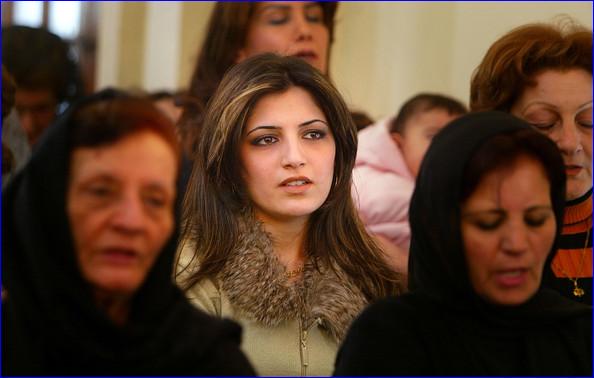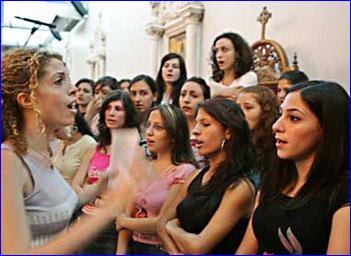


On March 21, 2014 the Syriac Orthodox Patriarch, His Holiness Mor Ignatius Zakka I passed away in Germany. After days of mourning, he was flown to Beirut to be buried in Damascus. I accompanied him on his last journey to a region of Syria torn apart due to the ongoing civil war.
Beiruth, Lebanon, May 24, 2014
I am going to get in, I have decided. After an entire week with archbishops and religious dignitaries from around the world, I just cannot sit and wait in Beirut while the others travel to Damascus, escorting the patriarch to his final resting place. Certainly, all the others are deacons, priests, or bishops. I had already sent a copy of my passport to Damascus, from Germany, asserting that I am a representative of the Syriac Orthodox Church in Sweden. All of a sudden I am a deacon.
I squeeze into a bus with ten bishops and a monk, among others. Finally, I get to see Syria again.
We are stopped at the border. We are asked to get out and show our passports to a priest who is collecting them. I swallow. Three times. An hour later, I am on the bus again. The adrenaline is rushing through me. I have made it. We enter Syria. On our right, is a giant Dunkin' Donuts. I ask one of the bishops whether he finds it ironic that the first food they offer upon entering the country is an American pastry. He says, smiling:
"People always must have something nice to eat."
On our left is a giant poster of a Turkish actress advertising perfume. The bishop concludes:
"And smell nice."
It is a huge procession now; the military, security guards, and TV teams with camera men on trucks all following the hearse. An armed car leads about one hundred meters ahead of the others. I am told that it is supposed to take the first hit if there is an attack.
We are getting close when my telephone beeps and I hear:
"Ministry of tourism welcomes you in Syria. Please Call 137 for tourism information or complaints."
A second later, there is another text message:
"Welcome to Syria. Feel at home while you roam on the MTN network. For any inquiries please call 111."
At 5:30 in the evening the procession enters the old town of Damascus and we descend from the vehicles. A huge photo of the deceased patriarch and the former president, Hafez al-Assad, father of the current president, Bashar al-Assad, lights up in front of us. There is a loud noise which sounds like an explosion. And another, far away. But no one reacts, except for us strangers.
I put on my backpack. People are looking my way; a bishop whispers that carrying a bag on your back is not a good idea because suicide bombers use this method. So I keep it in my hand. Thousands of people press along the narrow street to the church, the drums of the scouts are thunderous above the crowd. Now, church bells start ringing, together with the sound of the crying and cheering. The noise is deafening.

Beside me are three sobbing women. Approaching apprehensively, I discretely ask where they are from, are they from Damascus?
"No, we are from Qamishle. Before, the town was almost entirely Christian, now half of them have fled, soon it will be purged of Christians. It is not so bad there yet, actually, no fighting, but we are scared. The violence could flare up at any time and the Christians will be targeted as in Aleppo and Homs, which are completely purged."
The hearse is brought into the church. In the courtyard, a number of soldiers stand together with some militia men in plain clothes. I enter the church, pay my respects, join in the chanting of Our Father and exit again. I ask one of the militia men for a cigarette while my eyes rest on his armband with a cross on it.
"We are all Christian, both the soldiers and us civilians."
His cell phone rings, he excuses himself and walks a few meters away to answer. His colleague gives me a bottle of water. He is from northern Syria, he came to study in the capital and joined the army voluntarily and he wants to defend his country. Sensing my curiosity he says:
"Can you see the skinny guy over there, he has killed more than three hundred enemies, all of them from countries outside Syria."
The third guy, with the armband, calls him over, almost screaming:
"That idiot, I told him not to go yesterday, it is too dangerous right now. He is missing. Yesterday, he insisted to go and see his parents, he missed them so much. Now he is missing. He hasn't answered his cell phone for over 24 hours, his mother says."
Carefully, I start a conversation about the war, the president and the opposition.
Damascus is divided into different parts that are controlled either by one of the opposition groups or by the regime, just like many other towns, the young men tell me.
We are served coffee. I tell them that I am a journalist, giving them my name. One of them smiles.
"Yeah, you are the one who wrote about that family from al-Hassake that drowned in the waters between Turkey and Greece."
I ask them what is so funny.
"They have only themselves to blame; if you let yourself be sheep, the wolves will eat you. Human smugglers do it for the money and this is the result. I know several people who have gone missing while trying to flee to Europe, some of them married with families, small children even. They should have stayed and fought, so that we Christians can continue living in Syria."
The next day I try to encourage a deeper discussion with them. It is very warm and I ask the militia men if they have any spare water for me. They hand over an extra bottle. We are in the alley next to a church, they are guarding the building, they stop anyone walking by, checking through their bags and frisking them.
Suddenly one of them says:
"Tell all refugees that they can go to hell, they are all traitors. Eight of my friends have just arrived in Sodertalje, the cowards."
He is upset that Christians are fleeing instead of staying and fighting. One of his friends continues with pride in his voice:
"I was one of them, at first, those that wanted freedom, but it became clear to me and my dad, quite quickly, that we were fighting on the same side as foreigners who came to destroy the country and make it an Islamic Caliphate. Our president is the only alternative."
He barely has time to finish his sentence before we hear another bang. I flinch. They smile.
"It is not here, it is in a different district."
Two middle-aged men join us. They are served coffee. The men are from the same city as the sobbing women from the day before, Qamishle, they have flown in from Damascus on a freight plane. They sat on the floor together with other travelers, livestock and goods. I ask for their opinion, one of them is eager to tell his.
"Instead of opening the borders and handing out residence permits and destroying a population in an asylum system with high unemployment and lack of housing, Sweden, USA and the rest of the world should help us fight to stay here."
Bashar is popular amongst Christians and many believe he is the only one that can stop Syria from becoming a state with sharia laws where there is no room for Christians at all. This sentiment is shared even by those people who have witnessed his tyranny.
A few days after the funeral of the late patriarch, a new patriarch is elected in Lebanon. He is given the title Mor Ignatius Aphrem II. For many years he has lived in the States, in New Jersey, where his diocese is. After the appointment, I ask him whether he will stay in the States or move to Syria.
"Of course I am going to live and work in Syria; otherwise it would be a signal that we Christians have given up on Syria."
The next day I meet around twenty Christian refugees from Syria in Beirut, all of them on their way to Sweden and Sodertalje.
Two months later, I am back in Sodertalje and the sun is shining strongly. All the open air cafes are filled to capacity. Odette, Lada, both originally from Syria, and I sit at one of these cafes. We have a little contest, trying to figure out how many newly arrived immigrants we can identify. The clothes, hair and makeup and the way they walk are deciding factors.
While we are discussing the Syrian refugee situation, hell breaks out in Mosul, Iraq. All Christians have to leave and the newly elected patriarch of the Syriac Orthodox church, Mor Ignatius Aphrem II, travels to Kurdistan, Iraq to meet the refugees and their needs.
I called one of those that are in his delegation.
"We are trying to give them morale not to leave Iraq, of course we do not want our holy land, where the prophet Jonah was born and where Abraham came from, emptied of our people, but to be honest, I meet many that have family in places like Sodertalje, Sweden and are already trying to find smugglers who can take them there."
On average, twenty new refugees arrive in the small Swedish town of Sodertalje every week, most of them Assyrians and other Christians from Syria. The opposition and the president's followers meet again in this Swedish borough. The war has been going on for three years and president Bashar has received much support the last few months, both from inside Syria and from outside because many Syrians do not feel like they have any other option. The opposition is busy fighting each other and the country is in ruins.
We notice that history repeats itself, as we have the same discussions we had about Iraq a couple of ago, now regarding Syria. All Christians have fled from Mosul, Iraq's second largest city, since the radical Sunni Muslim group ISIS has taken over.
Let us hope we will not say the same thing about Lebanon or any other place in Middle East where Christians still live in some kind of peace.
First published on medium.com. For hour-by-hour updates on the Iraq crisis from those on the ground, follow Nuri Kino on Twitter.

or register to post a comment.